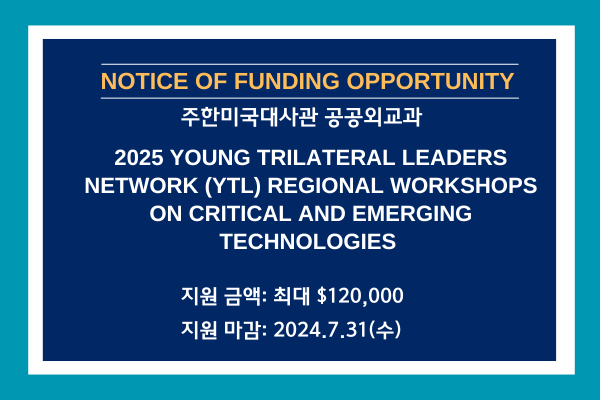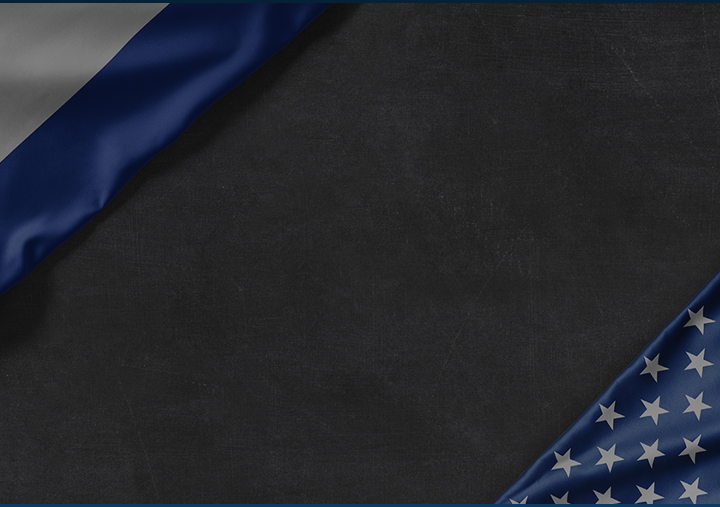행사안내

- 일시 2025
- 장소 한국, 일본
- 대상 미국 및 한국 기반의 비영리 단체, 공공 및 민간 교육 기관, 공공 국제 기관
- 연사/강사 '
- 참여기관 주한미국대사관 공공외교과, 주일미국대사관 공공외교과
- 문의 SeoulPDGrants@state.gov
- 행사요약 한국, 일본, 미국의 20~35세 청소년을 위한 중요 신기술에 대한 지역 워크숍 및 가상 참여에 중점을 둔 프로젝트를 선발하여 기금 지원
행사 내용
U.S. DEPARTMENT OF STATE U.S. EMBASSY SEOUL, PUBLIC DIPLOMACY SECTION
Notice of Funding Opportunity (NOFO)
Funding Opportunity Title: 2025 Young Trilateral Leaders Network (YTL) Regional Workshops on Critical and Emerging Technologies
Funding Opportunity Number: PD-SEOUL-FY24-04
Deadline for Applications: Wednesday, July 31, 11:59 p.m. GMT+9
CFDA Number: 19.040 – Public Diplomacy Programs
Total Amount Available: $120,000
A. PROGRAM DESCRIPTION
Introduction: The Public Diplomacy Section’s (PD) of U.S. Embassy Seoul and U.S. Embassy Tokyo of the U.S. Department of State are pleased to announce a Notice of Funding Opportunity (NOFO) for a series of regional workshops and accompanying virtual engagements on critical and emerging technologies to be run under a Cooperative Agreement as part of the 2025 Young Trilateral Leaders Network (YTL) program. YTL is a new initiative based on the outcomes of the 2023 Camp David Trilateral Leaders’ Summit and 2024 U.S.-ROK-Japan Trilateral Global Leadership Youth Summit that seeks to include youth aged 20-35 in meaningful dialogue about the shared opportunities and challenges facing the United States, Republic of Korea, and Japan.
The inaugural YTL programmatic year will focus on a series of regional workshops that encourage Korean and Japanese youth to collaborate with -- and learn from -- American peer experts on issues related critical and emerging technologies. Workshops should explore how youth living in the ROK, Japan, and U.S. can leverage new technologies to tackle the most challenging issues facing the Indo-Pacific region today. Potential programmatic topic areas could include:
- AI’s impact on democratic institutions and education systems
- Quantum computing- Social media mis/disinformation
- Young women’s participation and success in STEM fields
- Semiconductors
- Games and immersive technologies as collaborative spaces
- Next generation clean energy technology
- Leveraging new technologies to encourage youth civic participation
- Space exploration
Based on their organizational expertise, applicants may also propose other critical and emerging technology topics that are not listed here. Please refer to the White House’s Critical and Emerging Technologies List for more detailed information.
Target Audience: Korean and Japanese college students and young professionals aged 20-35 from diverse backgrounds who work, study or have a demonstrated interest in critical emerging technologies, speak fluent English, and are interested in trilateral collaboration. The total number of participants should be adjusted based on the available budget. Participants should reflect the United States government’s commitment to diversity, inclusion, equity, and accessibility
Location: Workshops must take place in both the Republic of Korea and Japan. Applicants are strongly encouraged to submit proposals that include most of their programming outside of the Seoul and Tokyo metropolitan areas. Virtual components should supplement in-person activities.
Timeline: Successful proposals should include a series of focused programs on topics of interest that will take place starting throughout 2025.
Alumni Engagement: Proposals must explain how the inaugural program year will build a tight-knit network of program alumni and should include a robust and realistic alumni engagement plan.
Monitoring and Evaluation (M&E): Proposals must include a substantive monitoring and evaluation plan that sets clear goals and metrics to be tracked throughout the project. In addition, M&E plans should include data collection (via focus groups, surveys, etc.) of participant populations to capture their feedback on the program and opinions on broader trilateral cooperation.
Misc:
• Proposals must include an American element or connection with U.S. experts, organizations, or institutions. Proposals may include requests for international travel and related costs of experts, speakers, and key individuals in support of broader activities.
• Given the nature of trilateral programs, programs should be conducted in English – or if the target population lacks English fluency, must include interpretation. Programs whose exclusive goal is teaching English will not be considered. • Programs relating to partisan political activity;
• Programs that involve travel to the United States or countries besides the Republic of Korea and Japan;
• Charitable or development activities;
The following types of programs are not eligible for funding:
- Construction programs;
- Programs that support specific religious activities;- Fundraising campaigns;
- Lobbying for specific legislation or programs;
- Scientific research;
- Programs intended primarily for the growth or institutional development of the organization; or
- Programs that duplicate existing programs.
더 자세한 내용은 상단의 안내자료를 다운로드 받아 확인하실 수 있습니다.
작성자 : kuva.southkorea@gmail.com


























